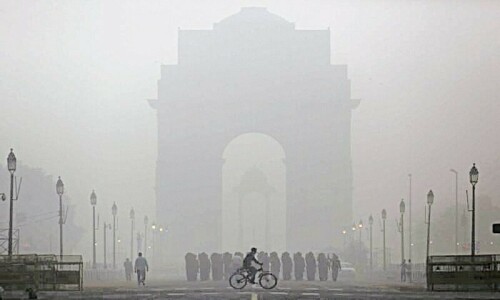To make independence meaningful, the lives of Indians were to be reorganised around the two political values of democracy and republicanism. Democracy was to undo India’s complex unevenness. Embedded in the nation’s official name, republicanism was to become a way of life of the Indian people.
The forms taken by Indian democracy over six decades have made western models of democracy appear unfamiliar. Most Indians have become democratic and at least some Indians have regularly complained of an excess of democracy. Interestingly, while democracy has received extensive attention, India’s republicanism has remained under-emphasised.
India does not really possess a republican sensibility. Indians live in a republic but scarcely live a republican way of life. We have celebrated the nation’s republican identity for sixty-two years without seriously considering the virtues of republicanism. Indian republicanism appears underdeveloped.
India’s democracy obscures its republicanism. School texts tell India’s prospective citizens that India became a democracy to remove inequality among its people. They also tell us that India is a republic because the head of its state is elected by the people. This lesson is deceitful because it is half told. The right of electing the head of the state implies equality among people. Thus we have a condition: we are taught that Indian democracy is pursuing the annihilation of inequality, but it is not sufficiently emphasised that we are all already equal. Every individual person, as citizen, is always equal to all other persons as citizens – this is the insistent beauty of republicanism. India’s republican declaration promised this to all Indians.
This condition causes democracy to gain a disproportionate moral edge in the popular imagination, which comes at the cost of republicanism. Indian democracy, Pratap Bhanu Mehta recently observed, is a feat of improvisation. One of its innovations is that it pursues eventual equality by creating competing inequalities. It structures state institutions and political culture such that people as groups compete to be identified as deprived or ‘backward’ in order to eventually become equals with each other. This may be the most effective route to attaining a general equality of conditions. But it is harmful to ignore at least three of its side-effects.
One, democracy enables politics to consume the public imagination by pushing alternative anchors of communal life – a civic or communitarian ethos, for instance – to the margins. Politics has more or less become the only palpable subject of discourse in Indian public life. Its dominance discourages civic initiatives by ever presenting the danger of turning them into political conspiracies. It is one of the main reasons why civic concerns are rarely taken seriously in India.
Two, democracy virtually stunts the growth of civic individualism. The privileging of groups, though necessary for correcting historical wrongs, somewhat de-legitimises the emphasis on the individual. Democracy paints individualism in a general negative. It encourages the conflation of the individual with the group, ignoring that the individual cannot to be lost to the group.
Indian democracy disservices its own future by disallowing the possibility of the individual to transcend her group being; It does this by preventing the ideas of freedom, equality, justice and responsibility from acquiring the subtlety that would be urgently needed when disenchantment with group being sets in. It is useful to note that progressive ideas are generally articulated by individuals – Marx, Ambedkar or Gandhi – who identify with groups but also transcend them in order to emancipate societies.
Three, the over-presence of politics and the de-emphasis of individualism deepen the already pervasive moral crisis of India’s public life. By restricting the scope of an individual’s public existence, Indian democracy compels individuals to apologise for thinking responsibly about civic duties. This anti-individual common sense of democratic politics arrests everyday citizen initiatives in public lives and punishes those who persist for their conviction.
Democracy also deters individuals from dissenting against corrosive influences of tradition on personal grounds. If you marry outside your caste, region or religion, it is not your personal preference but the social impact of your act that has greater chances of acceptance.
The under-emphasis and the underdevelopment of Indian republicanism beg questions. Was the term Republic used in the Preamble only to make that text lofty, like the now hollowed-out term Socialism? Was the farsightedness of the Constitution-makers partial: soundly anticipating the transformations democracy would bring about but missing out on the harm it might do to republicanism?
It is also possible that Indian democracy disfigures itself by undermining republicanism. It enables groups and classes at the lowest rungs of India’s complex unevenness to become political rulers. But this doesn’t necessarily change the grammar of political rule. Indians elect the head of the state. It is a republican practice because it negates hereditary claims on rule. But in the more consequential exercise of their right to vote, Indians also turn nouveau elites into hereditary claimants of power. Though we exercise our democratic right to vote, we undermine our own republican values.
Democracy in India hardly empowers the individual for her moral worth, for what she can potentially achieve. Individuals find their own lives worth living if the value of their existence is affirmed by an external source. All great republics have acted as that external source of affirmation to their citizens. Its absence in India prevents the idea of individual worth, rights and all, from becoming personal and experiential in public life. Indians find themselves vulnerable and incapable of achieving much individually because the civic radars that could receive their concerns for their merit are either weak or non-existent. My vulnerability is exposed each time I am threatened by the boorish man for suggesting he mustn’t spit anywhere at his heart’s content, or by the group that plays loud music in Mumbai’s local trains – for civic reasons of maintaining hygiene or public sanity – and I find no support from the bystanders.
But Indian democracy undermines republicanism in more artful ways. Because India’s public life is deceptively unresponsive to the individual’s moral worth, traditional frames of reverence, with their hierarchical codes intact, continue to condition human interactions. Thus, the patriarchs and the high commands continue at the centre and are dutifully replicated in other spheres of life. Their families and uninspiring offspring may prosper in politics or proliferate elsewhere without having their legitimacy questioned.
Democracy may cause yesterday’s disadvantaged to become today’s rulers. But the new rulers often do not challenge the hierarchy. Doing so would clear the space for genuine human dignity based on an already existing equality that the republic acknowledges. Sadly, they see their mobility as the end of radicalism. Democracy thrives, republicanism suffers.
The virtual absence of India’s republicanism makes Indian people, abstract and susceptible to being played around, more important than Indian citizens. However, as the crisis of India’s public life deepens, the anxiety it generates is bound to seek purposive expression. Emphasising the country’s republican identity would not resolve the crisis, but it could make it less acute. It would also offer Indian democracy a foil against its own undesirable excesses.
But this would need remembering that India would remain a republic on 27 January too. It would need some meaningful living with that fact.
The author is with the School of International Studies, Central University of Gujarat at Gandhinagar, India.
The views expressed by this blogger and in the following reader comments do not necessarily reflect the views and policies of the Dawn Media Group.














































